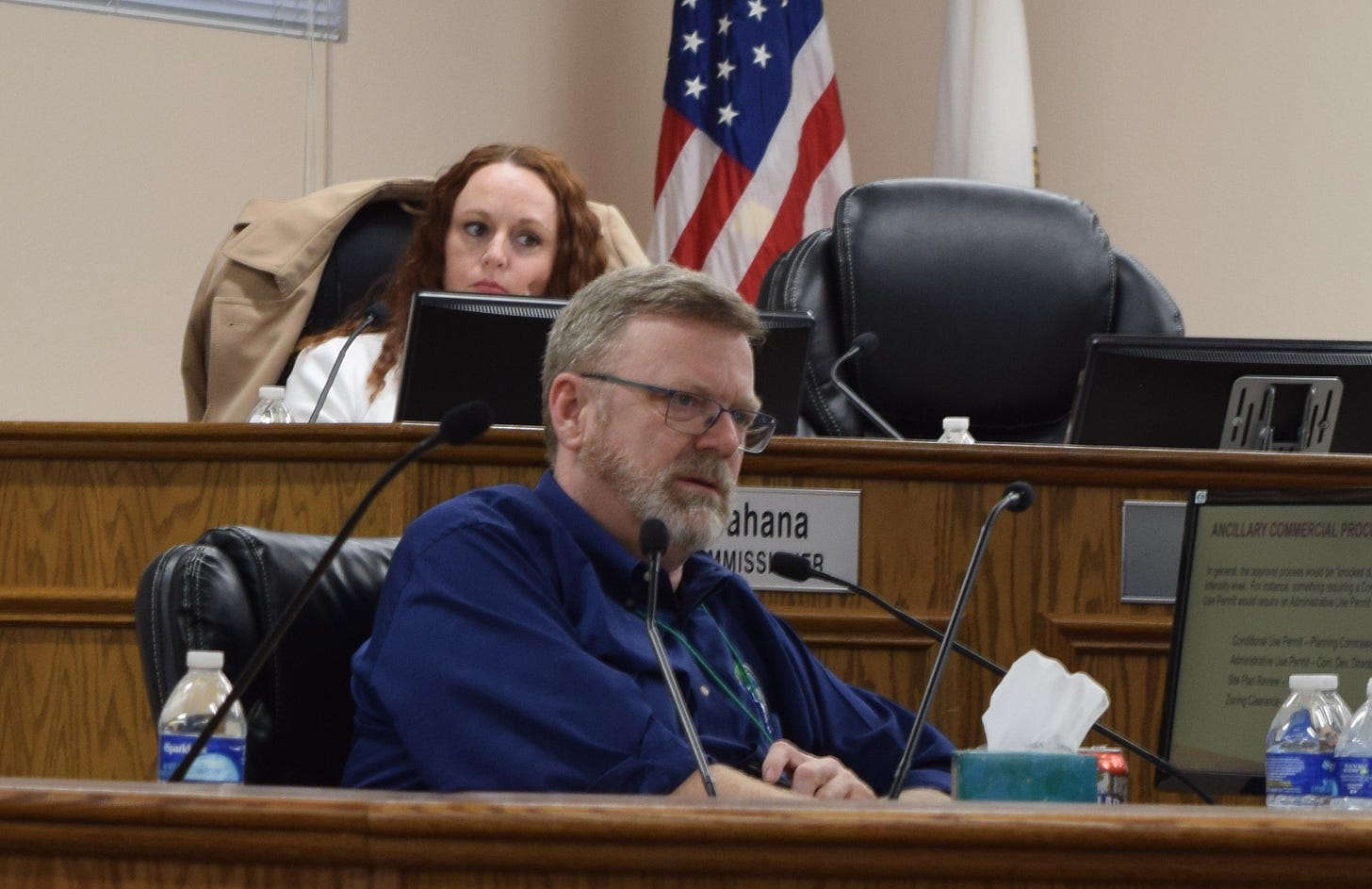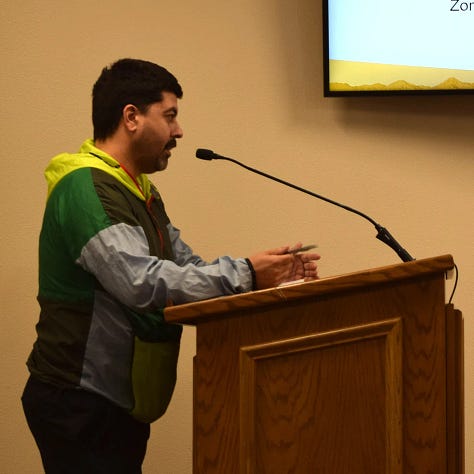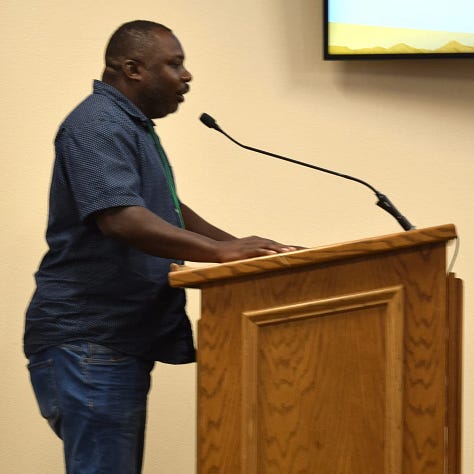RECAP: Twentynine Palms Planning Commission, March 4, 2025
Vice Chair Cure gaveled a meeting that included two workshops and business owners speaking in favor of lowering start-up barriers

Tuesday evening, the Twentynine Palms Planning Commission held a regularly scheduled meeting where they approved the State housing element report and hosted a study session with two workshops, one of which pertained to those operating commercial businesses. Four of the five commissioners were in attendance for the fifty-minute meeting; Chair Max Walker was out with an excused absence due to illness.
Study sessions are not typically recorded or live streamed by the City, so video footage is only available for the first twelve minutes of the meeting, found here. Our agenda coverage for the meeting can be found here.
PUBLIC COMMENT
None
COMMISSION COMMENTS AND REPORTS OF MEETINGS ATTENDED
Commissioner Alex Garcia reported attending the Twentynine Palms City Council meeting, a DBA (Downtown Business Association) meeting, and a protest in Joshua Tree, reporting that the event had a great turnout. Vice Chair Jessica Cure, who was filling the role of Chair for the first time due to Chair Walker’s absence, reported that she would be attending a scheduled meeting with businesses on Thursday, March 6.
CONSENT CALENDAR
The only item on the consent calendar was approval of the February 18 meeting minutes. At the last meeting, commissioners discussed regulations for mobile home parks and commercial campgrounds, which included requirements for trash receptacles based on acreage, showers, and dump stations. Vice Chair Cure had a clarifying question on the minutes:
I wanted to see the consensus for the mobile home park trash enclosures. I thought we had decided that the trash enclosures would be required if individual trash service wasn’t implemented. Am I remembering that consensus correctly?
At the February 18 meeting, commissioners had set the required number of trash receptacles to two for parcels under five acres, and three trash receptacles for parcels that are five acres and above. Motion to accept the minutes as written was proposed by Commissioner Leslie Paahana and seconded by Garcia, approved 4-0-1.
PUBLIC HEARINGS
Housing Element and General Plan Status Annual Reports
Community Development Director Keith Gardner led a public hearing on the state-mandated Housing Element report and General Plan status update. This report, which will be forwarded to City Council and then the State, notes that 24 residential dwelling units were constructed for the entire calendar year in 2024, and there are 965 more units to be completed by 2029 in order for the City to meet its Housing Element obligation.
Gardner said these numbers are typical throughout the state:
This situation is not unique. It’s prevalent all over California, about very high arena numbers that seem to be unobtainable, but this is where we are.
As for the General Plan status report, there were no major changes made to the City’s General Plan in 2024, but Gardner did cite a list of engineering projects the City took on last year, including eight neighborhood safety improvements, safe school routes, with several more pending road improvement projects for 2025.

The annual housing element report shows the number of housing units constructed from 2021 to 2024 and then divides them into four income categories: Very Low, Low, Moderate, and Above Moderate. To date, 18 low-income housing units and 64 moderate-income housing units have been constructed in Twentynine Palms since 2021, for a total of 82 housing units altogether.
In the future, housing element reports will be moved to the consent calendar due to amendments in the City Code. Motion to accept the housing element and general plan annual status reports posed by Paahana, seconded by Commissioner Jim Krushat. Approved 4-0-1.
FUTURE AGENDA ITEMS
Commissioner Paahana requested the Commission address Residential Development Standards section 19.69.040, regarding the ten-year permit renewal of mobile homes, as a future discussion item, so the code can be in sync with current efforts surrounding mobile home and special occupancy parks.
COMMUNITY DEVELOPMENT DIRECTOR UPDATES
Community Development Director Keith Gardner reported meeting with the business community to discuss ancillary entertainment, having met with Rediscover 29 last week. Gardner says the revised ordinance on entertainment “seems to be well received” and is hoping to bring it forward for Commission approval in April. Gardner then reminded meeting attendees and at-home viewers that the live stream would end for the study session.
STUDY SESSION
Ancillary Uses in Commercial Business Workshop

Community Development Director Gardner led the workshop discussion on the topic of ancillary uses in commercial businesses, and began with defining “ancillary use” as “a business or a commercial establishment that provides an extra service or selling an extra product that they were not originally approved for but are still allowed in a development code.”
Acknowledging a constantly evolving business economy, Gardner called the City code fairly rigid with regards to shared uses in commercial spaces, then listed some examples of what can be considered ancillary activity:
Ancillary commercial is a business within a business. A very prominent example would be the Burger King inside of the Walmart over in Yucca Valley. This is not that unusual. We also have the Fish-A-Licious inside the liquor store market [at the eastern end of 29 Palms Hwy].
According to the agenda packet, the City receives a lot of requests for commercial businesses with ancillary activity taking place within them, and the Planning Department is hoping to knock down the intensity of the application process, both for City staff and business owners.
City code currently interprets ancillary commercial businesses as a completely separate business, and it often requires approval of a Conditional Use Permit (CUP) or a Site Plan Review. Gardner is looking to downgrade the required permit level, for example, from requiring a CUP to an Administrative Use Permit (AUP) instead, which is less onerous for business owners to apply for and requires less scrutiny from City staff.
There's a lot of shared spaces now, and I'm just going to say this—the business community is usually a lot more creative than the rules and regulations typically allow for. So we're looking into establishing some policies here for ancillary uses and ancillary commercial activities. And these are working definitions and working thought processes, and we're looking for feedback from the Commission as to whether or not we're headed in the right direction, or if we need to modify this.
Gardner clarified the different permit types at the City—CUPs are reviewed by the Planning Commission, while AUPs are reviewed by the Community Development Director.

Commissioners sought clarification on the different types of businesses that could potentially fall under the “ancillary use” category. Commissioner Krushat posed a series of questions and used a beauty supply shop as his example, which had come up in recent city discussions,
But I can’t have a beauty supply place all of a sudden start cutting hair?
Gardner responded to Krushat,
So in the case of the beauty supply store, wanting to have a business within a business where they [want] to cut hair— and I know they're in the audience right now— it would be knocked down, in theory, to a zoning clearance letter, provided that the primary use and primary building are completely done to code and they're meeting whatever state requirements.
Commissioner Garcia raised a question on the Bowladium, which also operates a bar and Mexican Street Tacos. Gardner said these are trickier examples because they have separate entrances:1
Because you don't have to go through the bowling alley to get to the taco shop, you don't have to go through the bar to get to the bowling alley.
Commissioners Krushat, Garcia, and Paahana were in favor of making the city code easier on businesses. Commissioner Leslie Paahana stated:
I definitely like your knock-down intensity level of this approach for it. This is to support the community, and if they can get it done way easier at these levels, that seems like a good way to start this right now.





In public comment, business owner Karen Harper, who co-owns Jeanine Beauty Supply (the beauty supply store Gardner and Krushat alluded to in discussion) made clarifying comments and asked if this workshop would allow a barbershop to come into her business without a site plan review:
It's a retail—it’s beauty supply. There's no salon. We don't do any kind of hair. We only sell products. As far as the barber shop, like you said, we're just going to be renting some space. He has his own license. What I'm concerned about is the price. Is the [permit] price going to change?
Gardner explained the different permit levels and the costs for business owners to apply for each: CUPs are roughly $5,000; AUPs are $3,000; Site Plan Reviews are about $1,600; and Zoning Clearances only require a letter, which is at no cost. “So anything that would require a site plan review would just require a letter in the future,” said Gardner.
Current code requires approval for the barbershop to fall under a site plan review, at a cost of $1,600. Updating the code would mean an expensive site plan review is no longer required, and the barbershop would only need a zoning clearance letter instead.
Vice Chair Cure asked Harper if she was in favor of knocking the required permitting down a level, which Harper affirmed:
I really am, for the simple fact, we have a space that we can help someone start a business in the community, and he's renting from us. And we have three doors. He has a separate entrance. We have our front door, and we have an alarm system, so he would have his own separate alarm system, and it wouldn't even affect Jeanine Beauty Supply. Because he has his own separate entrance, his own separate bathroom.
Coriano, barber and business owner, who’s renting of a space connected to Jeanine Beauty Supply has come under recent scrutiny by the City, spoke at the podium:
It's been affecting my business for quite a few months now, so I just kind of want to know what's going on.
City Councilmember Octavious Scott stated he is in support of anything that is “pro-business,” and that he believes this will help the local economy. Terence Latimer, owner of Black Cactus Co-Working, spoke in favor of making the requirements easier on businesses:
I have lots of businesses that come in and maybe don't have either the capital or the network to get their own space, which, if we're mindful of the capital requirements for getting started with a business, it can be very expensive, right? Figuring out first and last months [rent], paying security deposits for utilities, all that sort of stuff, right? And so just mindful of the flexibility that we are starting to see in the economic environment—I mean, Airbnbs for all intents and purposes, are businesses within a business on the residential side, right? I think it only makes sense that we're starting to see some of that on the commercial side.
Closing public comment, Commissioners discussed the presence of separate entrances, primary use requirements such as parking needs and bathroom access, and the Cold Stone ice cream location, which operates three businesses with one entrance—a gift shop and the Rocky Mountain Chocolate Factory.
Commissioner Paahana asked Gardner whether current businesses would be grandfathered or if everything would be subject to an updated policy. Gardner confirmed any updated policy would only apply to businesses moving forward.
Similar to ancillary entertainment, residents and business owners alike can anticipate more on this topic at future City meetings.
Article 5 Workshop
Again led by Community Development Director Gardner, this was an introductory workshop on Article 5 of the City of Twentynine Palms Development Code. The entire section of the code is 190 pages.
Gardner said sections on topics such as animal keeping, automobile/vehicle related uses, and bingo licenses had inconsistencies and said this workshop is merely introductory.
Cure asked if this would be discussed again at another workshop. Gardner explained the intended process:
The way we're going to approach these development code amendments in the future is, we want to give the Planning Commission an introduction to the topic, like we did today, get direction so that the Commission is familiar with it, so that we don't hit you cold with a development code amendment that you're not familiar with.
With no public comment and no further Commissioner discussion on the second workshop, the meeting adjourned. The next Planning Commission meeting takes place on Tuesday, March 18, at 5 pm.
Leave your thoughts in the comments below. Please note that we do not allow anonymous comments. Please be sure your first and last name is on your profile prior to commenting. Anonymous comments will be deleted.
Feel free to share this article!
Support the Desert Trumpet by subscribing!
Much like Mexican Street Tacos, which has a separate entrance not connected to the Bowladium, the barbershop to be located adjacent to Jeanine Beauty Supply also has its own separate entrance.


